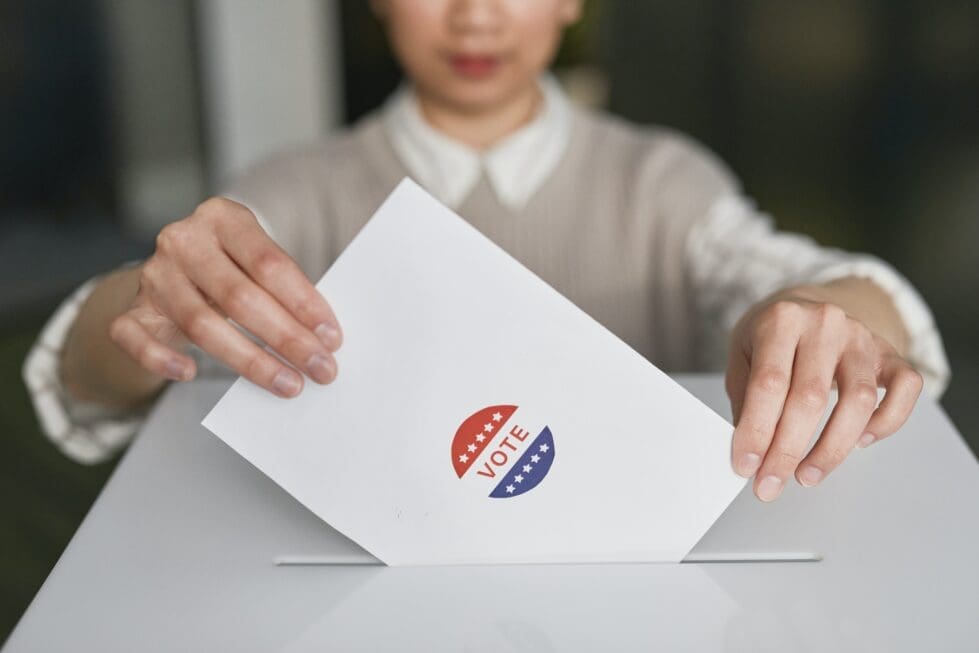
A Senate committee spoke favorably about a bill that would change parts of the Delaware Constitution on voting.
Photo by Edmond Dantès, Pexels.
A bill that would ditch a constitutional requirement that people must live in Delaware for a year before voting, officially change the voting age to 18, remove the literacy requirement for voting and make it easier for ex-felons to vote seems headed to the full Senate.
Senate Bill 180, sponsored by Sen. Kyle Gay, D-Elsmere, would do all that.
Because the bill is a constitutional amendment, it requires a two-thirds vote and would need to be approved by both this session of the General Assembly and the next one, which starts in 2025.
Senate committees don’t vote publicly on bills, So it was not immediately apparent what the vote is, but the bill faced no major objections.
SB 180 makes it easier for ex-felons to vote by allowing felons to vote if they are on a work release, early release, supervised custody, community supervision, probation, parole, or suspension.
The constitution previously only allowed exceptions for probation, parole or suspension.
Those in prison would not be allowed to vote during the time of their incarceration.
The bill also would forbid the state from ever setting up a program that requires felons to pay to have their voting rights restored.
The constitution now allows the General Assembly to take voting rights away from someone who has committed a crime. This bill would not allow that.
Neal Ubriani, policy and research director for the Institute for Responsive Government, said there are an estimated 4,300 people in Delaware who aren’t incarcerated but still can’t vote because of a past felony conviction.
“In addition to being simpler, it’s worth noting that this new rule prevents recidivism,” Ubriani said. “Substantial research has found that people whose voting rights have been restored are much less likely to reoffend.
“This makes logical sense. When people feel like they belong to a community and are an active participant in its affairs, they’re less likely to commit crimes.”
Sen. Bryant Richardson, R-Seaford, said he’s happy that the amendment changes the minimum age to 18 years and older, and doesn’t have any issues with the bill at this time.
Jack Young, co-chair of the League of Women Voters, said it supports the bill because other states are taking actions to restrict voting rights.
“At every level of government, full, fair and open voting is a fundamental citizen right,” Young said. “Yet we are seeing anti-voting provisions pass in several state legislatures around the country.
“Fortunately, the mid-Atlantic region is not one. These restrictions disproportionately impact voters of color and people with disabilities. SB 180, introduced by the chair of this committee, is fully supported by the league.”
Claire Snyder-Hall, executive director of Common Cause Delaware, said they support the bill.
“People who have done their time need to be reintegrated back into the community and restoring the right to vote helps with that process,” Snyder-Hall said. “Why should they be permanently marginalized?”
Davon Marque Hall, a previously convicted felon who couldn’t vote in 2008, said he wished he could have voted for Obama in 2008 but couldn’t.
“I was locked up for 10 months without being actually proven guilty,” Hall said. “I was locked up and I didn’t know then that.technically I had the right to vote … That being the first election that I could have voted in, I actually cried.”
The bill, which doesn’t require a fiscal note, has 22 additional sponsors and cosponsors, all Democrats. If approved by the committee, it will go to the Senate ready list to be heard on the floor.
The committee also discussed House Substitute 2 for House Bill 142, sponsored by Rep. Eric Morrison, D-Glasgow.
Related Story: Spiegelman talks Nazis in opposing LGBTQ panic defense bill
It would forbid a defendant in a court case from claiming they reacted violently when they realized that someone else was of a certain gender, sex, sexual orientation, or gender identity.
Sen. Sarah McBride, D-Wilmington, a transgender woman, said that while she isn’t aware of the defense being used in Delaware, it’s important to pass the law so that it can’t be.
McBride said that the bill is important because of the attacks being carried out across the country against the LGBTQ community.
“All of this is especially important in today’s environment,” McBride said. “Just two days ago, the United States Department of Homeland Security reported that threats of violence against LGBTQ people are on the rise and intensifying…I shouldn’t have to fear that someone’s disgust at who I am and my body is grounds for them to commit violence against me or an excuse for them to commit violence against me.”
Mark Purpura, president of Equality Delaware, said he also feels the bill is important to help the LGBTQ community in Delaware, especially in light of legislation being passed in other states.
“We are seeing across the country an unprecedented attack on the LGBT community with unprecedented amounts of legislation targeting gays, lesbians, transgender Americans, particularly in the transgender youth communities,” Purpura said. “At the same time we are seeing an unprecedented increase in violence against these communities. And I think this is a very important bill to the LGBT community in Delaware to protect that community.”
The bill, which doesn’t require a fiscal note, has 23 additional sponsors and cosponsors, all Democrats except for Rep. Michael Smith, R-Pike Creek.
Share this Post




